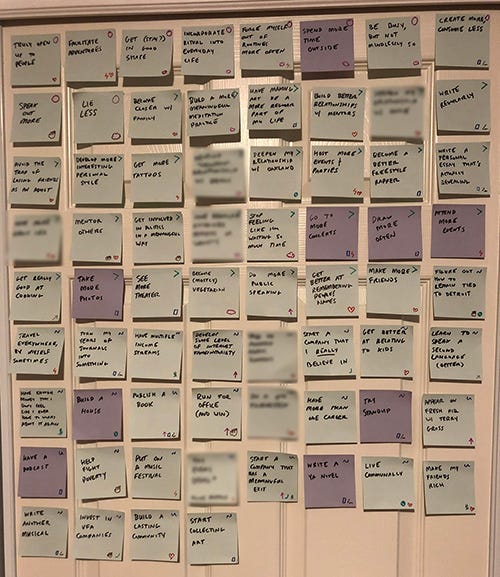Life Audits: The One Personal Planning Exercise I Actually Do
Since I spend a lot of time in Silicon Valley-adjacent circles, I’m frequently exposed to various kinds of personal improvement and life planning exercises. And generally speaking, I hate them. There’s just something I find so distasteful about the impulse to perpetually optimize yourself, to plan your life the same way you’d plan your company’s quarterly goals. These approaches are counter to a kind of messiness and spontaneity that I see as an essential part of what it means to be alive. It’s all well and good to strive to improve yourself, but I don’t trust anyone who doesn’t at least occasionally get so hung over that they start to regret every choice they’ve ever made in their entire life.
Or maybe I’m just jealous of what these exercises imply about the kind of people who do them: their ability to know exactly what they want for themselves and who they want to become, their ability to strive towards it with the same kind of single-minded focus one would use to climb a mountain. My own haphazard bouts of self-improvement tend to proceed in jagged fits and starts, in that intermittent dance of two steps forward, one step back. I’m reminded of St. Augustine’s prayer, the only Christian prayer I know: “God, grant me chastity and continence… but not yet.”
When I meet the kinds of people who are my polar opposite in this regard—the kinds of people who set regular quarterly goals for themselves, who track every metric they can collect, who have a personal board of advisors—my disdain for this kind of person is usually combined with a sort of perverse admiration. Maybe I’m right that the path to the good life doesn’t lie in smoothing away all the imperfections that make us human. Or maybe I’m just using lofty ideas to justify my own self-destructive behavior, and sneering at those whose considered approach to bettering themselves forces me to look to closely at my own flaws.
Anyway, this is all a roundabout way of getting at the fact that of the dozens of these kinds of exercises I’ve been exposed to over the years, there is only one that I’ve actually integrated into my life: the life audit. (I don’t really like the term “life audit,”but that’s what the person who told me about this activity called it, and it’s how I’ve referred to it ever since, so I’m going to keep using it.)
I was introduced to the life audit at a friend’s combination birthday party slash unconference, which is the kind of weird event you get invited to when you live in the Bay Area. I was still smarting from the failure of the startup that had consumed the last four years of my life and still struggling to figure out what I was going to do with myself next, and as a result, I was more open than usual to alternative ways of living. So I decided to try it.
Here’s how a life audit works. First, you spend an hour or so writing as many desires for your life as you can think of on post-it notes. Any desire will do—they don’t have to be things you plan to actively pursue. Think of them as more like wishes than goals. Then, you categorize your desires in three time-based buckets: always, soon, and eventually.
Finally—and this is the most important part—you don’t do anything else besides put the post-its on your wall and look at them from time to time.

The component of the life audit that made this really work for me was the fact that you don’t consciously do anything with these desires. I am not a very goal-oriented person: it’s always felt more natural to me to operate on whims and impulses, to grab ahold of opportunities as I stumble into them, than it has to actively work towards specific goals. Or maybe another way to put it is that my goals tend to be more about practices, habits, and behaviors than concrete outcomes.
Every time I’ve done a life audit (usually around every one or two years), I’ve done nothing with the results besides keep the sticky notes on my wall for a few months and glance at them occasionally. And yet every time I’ve found myself moving more in the direction of these desires than I think I otherwise would have. Perhaps it’s kind of like how taking notes helps you remember something even if you never once re-read them. Looking back on that first one I did in 2018, I’m amazed at how many of these desires I’ve actually integrated into my life, even though I never consciously made the decision to pursue most of them.
So if you, like me, generally hate this kind of thing, you still might want to give this one a shot. It’s the only personal goal-setting/life planning exercise I’ve ever not found actively repellant. And I plan on continuing to do one of these every few years, until I get bored of them, or just forget.
Yours in feeling a little weird about having finally written something that actually contains actionable advice,
Max

